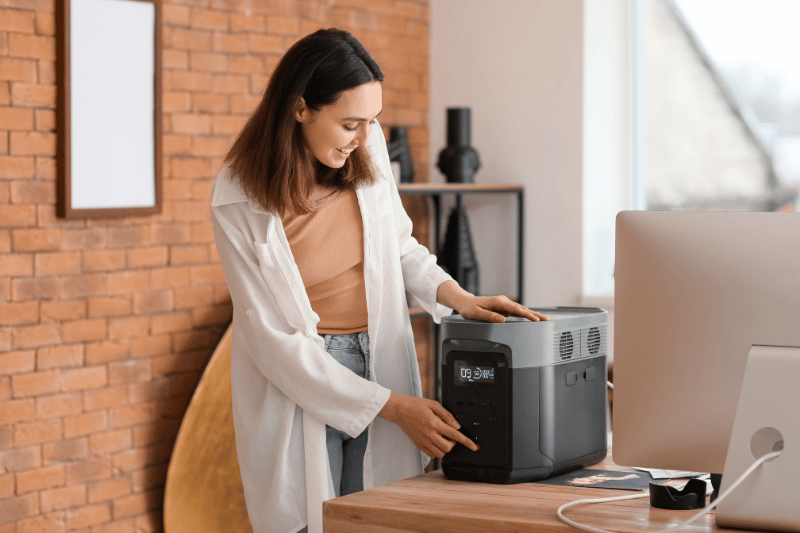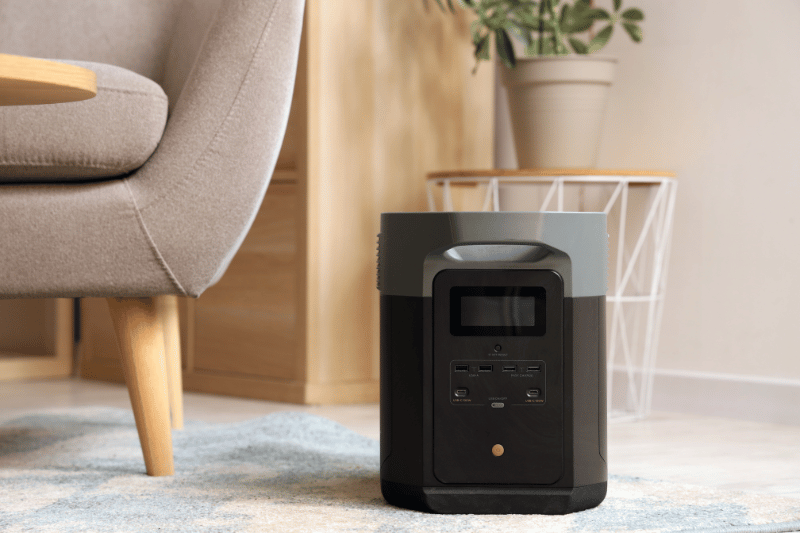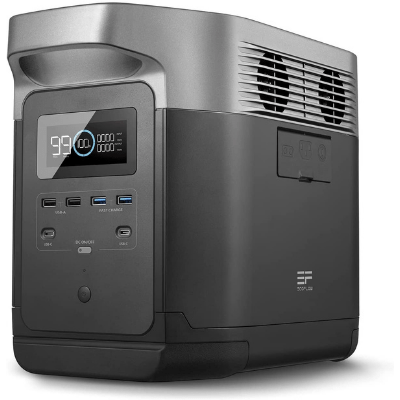Power outages are no longer rare — they’re routine. From extreme weather to rolling blackouts, the need for a reliable, off-grid power solution has never been greater. Enter EcoFlow, one of the fastest-growing names in the portable power station world. Known for its sleek, high-performance portable power stations, EcoFlow is rapidly becoming one of the most trusted names in off-grid power solutions and renewable energy storage.
Founded in 2017 by former DJI engineers, EcoFlow was born from the idea that battery-powered generators could be smarter, faster, and greener. The company now offers a full ecosystem of energy products — from the popular Delta series to the ultra-portable River line, all engineered to deliver backup power, solar charging capability, and a serious tech edge.
But EcoFlow isn’t just about charging your phone in the woods. With innovations like X-Stream fast charging, modular battery expansion, and compatibility with solar panel arrays, the brand is reshaping how we think about clean, silent power generation — whether you’re camping, living off-grid, or preparing for emergencies.
In this deep dive, we’ll look at what makes EcoFlow stand out in the growing world of portable energy solutions, explore its most talked-about product — the EcoFlow Delta 1300 — and assess whether the brand truly lives up to its green promise.
EcoFlow’s Sustainability and Innovation Ethos
EcoFlow isn’t just building portable power stations — it’s engineering a smarter, cleaner energy future. As a sustainable energy brand, EcoFlow blends cutting-edge lithium battery innovation with a clear environmental mission: making clean power generation accessible, scalable, and carbon-conscious.
A standout feature of EcoFlow’s recent models is the shift toward LFP (Lithium Iron Phosphate) battery chemistry. Unlike older lithium-ion builds, LFP batteries are safer, longer-lasting, and more environmentally friendly — offering thousands of cycles without significant performance loss. This aligns with EcoFlow’s goal to reduce e-waste and build products with real durability.
The brand’s commitment to solar-powered energy storage also sets it apart.
Most EcoFlow power stations are compatible with portable solar panel arrays, enabling users to harvest renewable energy on the go — no gas, no fumes, and no noise. Whether it’s prepping for emergencies or embracing off-grid living, EcoFlow offers a reliable, eco-friendly generator alternative.
Compared to other names in the space like Goal Zero and Bluetti, EcoFlow has carved out a niche by prioritizing rapid charging speeds, modular upgrades, and seamless solar integration. While Goal Zero focuses on rugged outdoor use and Bluetti leans into home backup solutions, EcoFlow balances sleek tech design with versatile performance.
Although the company hasn’t publicly detailed its ethical sourcing or recycling initiatives, its design choices — from non-toxic batteries to reduced reliance on fossil fuels — signal a strong step toward clean energy leadership in the portable power industry.
EcoFlow Delta 1300: The Model That Changed the Game

The EcoFlow Delta 1300 wasn’t just EcoFlow’s breakthrough product — it was a statement. A signal that clean backup power could be fast, powerful, and thoughtfully designed. In a market still dominated by gas generators and sluggish battery packs, the Delta 1300 raised the bar for what a portable power station could do.
With a 1,260Wh lithium-ion battery, six pure sine wave AC outlets, and a total of 13 output ports, this unit can run a refrigerator, charge a laptop 20 times, or power sensitive electronics like a CPAP machine — all without breaking a sweat. Whether it’s a home emergency, a camping trip, or an off-grid work setup, the Delta 1300 delivers reliable, high-capacity energy wherever it’s needed.
But what truly set it apart was speed. Thanks to EcoFlow’s proprietary X-Stream technology, this power station charges from 0 to 80% in under an hour — a feat that, at the time of launch, was virtually unheard of. In flood-prone areas or during rolling blackouts, that speed isn’t just convenient. It’s essential.
The build quality reinforces that same confidence. The Delta 1300 is encased in a sturdy blend of aerospace-grade aluminum and impact-resistant plastic, with a large LED display and two integrated handles. It’s solid — but at just over 30 pounds, not the easiest to carry for long stretches. The dual-handle design feels more practical than stylish, especially in high-stress situations where mobility matters.
It’s not flawless.
While EcoFlow rates the battery at 800 cycles, many users — including our own experience — noticed a capacity dip around 500 cycles. That’s not uncommon in lithium-ion batteries, but it does raise questions for those seeking longer-term, daily off-grid use.
And while AC charging is lightning fast, solar charging is far less impressive. Even with two 110W panels in full sun, a full charge can take anywhere from 14 to 28 hours — a stretch for anyone relying solely on the sun.
There’s also the issue of noise. The Delta 1300 is technically a battery-powered generator, but you wouldn’t always know it. Its internal fans spin up frequently — sometimes while idle or fully charged — making it less than ideal for silent environments.
Still, for all its imperfections, the Delta 1300 represents everything EcoFlow stands for: bold engineering, clean energy, and a move away from fossil-fueled dependency. It laid the foundation for the more advanced Delta 2 and Delta Pro, and even today, it holds its ground as a reliable, high-capacity option in the portable energy space.
Pros and Cons of the EcoFlow Delta
Pros
Cons
- Charges from 0-100% faster than any competition
- Plenty of different outlets
- Compatible with solar panels
- Capacity drops under 60% after 800 charging cycles
- Average battery when compared with other power stations
- For occasional use only
- Noisy fans that run all the time
- Limited portability
Breaking Down the EcoFlow Ecosystem: From River to Delta Pro
EcoFlow’s ambition was never just about one product — it was about building an entire ecosystem for sustainable, portable energy. And over the past few years, the brand has done just that.
From entry-level to industrial-strength, EcoFlow’s product line now spans three major series: River, Delta, and the modular Power Kits. Each serves a distinct purpose, but all share the same core DNA — fast charging, high output, and seamless integration with solar.
The River Series is tailored for portability. Lightweight and compact, these power stations are ideal for weekend trips, outdoor photography, or powering a few essential devices during a day hike. They’re not built for whole-home backup, but they’re unbeatable for grab-and-go energy.
Then there’s the Delta lineup, which includes the Delta Mini, Delta 2, Delta Max, and Delta Pro.
Each step up in this series offers more capacity, longer lifespan, and advanced features like LFP battery chemistry, smart app control, and expandable capacity. With the Delta Pro, EcoFlow pushes into whole-home backup territory, offering 3.6kWh of base capacity and the ability to expand to 25kWh — all while staying off-grid-ready.
Beyond standalone units, EcoFlow now offers solar panels, smart batteries, home transfer switches, and even modular power kits designed for RVs and tiny homes. It’s no longer just about having power in a pinch — it’s about rethinking how we power our lives, permanently and sustainably.
What makes this ecosystem work isn’t just hardware. EcoFlow’s mobile app lets users monitor usage, adjust charging speeds, and control ports remotely. For people living off-grid or managing solar input in real time, this level of insight is a game-changer.
Few competitors offer this level of interoperability. Brands like Bluetti and Goal Zero deliver powerful individual units, but EcoFlow’s edge is how well its products work together. You’re not just buying a generator — you’re stepping into a modular clean energy platform, one that grows as your needs grow.
Is EcoFlow Right for You? Best Use Cases and Real Users
EcoFlow doesn’t just make power stations — it solves real problems for real people.
Whether you’re trying to keep your fridge running during a blackout or brewing coffee from a mountaintop, EcoFlow has carved a space for users who need clean, portable energy that fits into their lifestyle.
The Emergency Preppers
For those preparing for the unexpected — hurricanes, grid failures, wildfires — EcoFlow offers peace of mind. Products like the Delta 1300 or Delta Pro can keep essential home appliances running during extended outages.
One reviewer on a disaster prep forum noted that their Delta 1300 “kept the fridge cold and phones charged through a 3-day power outage after a storm in Louisiana.” With fast recharging and multiple output options, it’s a favorite in the prepping community.
The Vanlifers and Off-Grid Travelers
For full-time vanlifers and weekend explorers, EcoFlow’s lightweight units — especially the River 2 Max and Delta 2 — pair effortlessly with portable solar panels to keep the essentials running: lights, laptops, routers, even induction cooktops.
Unlike gas generators, these stations are silent and emission-free, which means they’re welcome at most campgrounds and don’t pollute the wild places people escape to.
The Mobile Pros and Small Businesses
EcoFlow isn’t just for outdoor types. Contractors, food truck owners, and field-based professionals use EcoFlow products as portable worksite power — especially in locations where grid access is inconsistent.
Need to run a laptop, printer, and modem at a pop-up shop? The Delta series handles it without the noise or smell of traditional generators.
One mobile notary shared that their EcoFlow station allowed them to operate “a full remote office out of a car for days.”
The Casual Campers and Tailgaters
For families and casual adventurers, the River 2 or Delta Mini adds convenience without complexity. Charge phones, run a projector, or power a mini-fridge — all without worrying about gas, extension cords, or campsite noise restrictions.
It’s plug-and-play portable power, even for users who’ve never touched a generator before.
The Sustainability-Minded Homeowners
For eco-conscious users looking to reduce their reliance on fossil fuels, EcoFlow’s solar-ready units offer an entry point into home energy independence.
Paired with solar panels and smart batteries, these systems support partial off-grid living and serve as a backup when utility power fails.
Where EcoFlow Falls Short: Honest Drawbacks to Know

For all its engineering strengths, EcoFlow’s products aren’t without limitations. While many users appreciate the innovation and performance, several common concerns continue to surface — especially as competitors catch up in certain areas.
Battery Lifespan vs. Reality
EcoFlow advertises 800 full charge cycles on its lithium-ion units before battery capacity drops below 80%.
In practice, however, some users report noticeable degradation closer to the 500-cycle mark. While this doesn’t render the unit unusable, it does mean shorter battery life than expected — particularly for those who rely on their power station regularly.
Premium Price Tag
EcoFlow isn’t the cheapest option on the market. Compared to brands like Bluetti or Jackery, you’ll often pay more per watt-hour. The tradeoff is in speed, build quality, and features — but for users on a budget, that price premium may be hard to justify.
Delta 1300, for example, costs around $1,399, which puts it in direct competition with newer, more efficient LFP-based models.
Portability Challenges
While marketed as portable, models like the Delta 1300 (weighing over 30 pounds) aren’t easy to carry for long distances. The dual-handle design, while sturdy, isn’t ideal for solo transport in emergency scenarios or on-the-go setups. For vanlifers or preppers needing lightweight mobility, this can be a limiting factor.
Solar Charging Limitations
EcoFlow supports solar integration, but charging performance varies. Even with two 110W solar panels under optimal conditions, the Delta 1300 can take 14–28 hours to fully recharge.
That’s a steep wait for users relying exclusively on solar, especially during cloudy days or winter months.
While newer models are improving solar input efficiency, it’s still a pain point for off-grid enthusiasts.
Frequently Asked Questions (FAQ)
EcoFlow is a U.S.-Chinese portable power company that was founded in 2017 by a group of entrepreneurs with a background in the drone industry. The company gained publicity with its Delta and River series of power stations.
EcoFlow is a top-tier solar generator brand, but solar charging speeds—especially in models like the Delta 1300—lag behind newer competitors like Bluetti.
A generator will charge a battery very slowly and inefficiently. In some cases, you’ll never be able to get it fully recharged with a standard 12V port generator. Unlike portable power stations, generators are made to power small 12V devices directly, without a battery.
EcoFlow is a multinational company with offices in San Francisco, CA, and Shenzhen, China.
No, EcoFlow is a U.S.-Chinese company developed by engineers who formerly worked for a Chinese DJI drone company. It is based in San Francisco, CA and Shenzhen, China.
The EcoFlow Delta 1300 is rated for 800 full charge cycles, but many users report capacity reduction after around 500 cycles. You can still use the unit beyond that, but you'll get shorter runtimes and more frequent recharges.
EcoFlow units like the Delta Pro can power most essential home appliances during outages. While the Delta 1300 can support fridges, lights, and small devices, it may not handle full household loads on its own. For full backup, multiple units or expansion batteries may be required.
The Delta series offers higher capacity, more output ports, and better performance for emergency and whole-home use. The River series is smaller, lighter, and ideal for camping, road trips, or day-use power needs.
Yes — but with caveats. The Delta 1300 still delivers fast charging, high output, and reliable performance. However, newer models like the Delta 2 now offer LFP battery chemistry with longer lifespans, making them a better long-term investment.
Final Verdict: Is EcoFlow a Brand You Can Trust?
EcoFlow has earned its place as one of the most respected names in the portable power industry, not just through smart design and fast-charging tech, but by delivering on a broader promise: clean, accessible energy that fits modern life.
From emergency backup to full off-grid setups, the brand offers impressive product versatility across its Delta and River lines. Its innovation around X-Stream charging, growing integration with solar systems, and thoughtful app-based energy management all point to a company focused not just on performance — but on long-term sustainability.
Yes, there are tradeoffs. The use of traditional lithium-ion batteries in older models means faster degradation compared to newer LFP-based units. Solar charging could be faster. And portability isn’t always as effortless as advertised. But taken as a whole, EcoFlow’s ecosystem delivers something most competitors still don’t: a modular, future-forward clean energy platform that adapts to both casual and committed users.
For those who want maximum solar efficiency, Bluetti might offer an edge with its LFP-first approach. For lower-budget entry-level units, Jackery could make sense. But when it comes to balanced performance, charging speed, and ecosystem flexibility, EcoFlow still leads the pack.
In short — yes, EcoFlow is a brand you can trust. Especially if you’re ready to trade noise, fumes, and fuel for a smarter, greener source of power.



